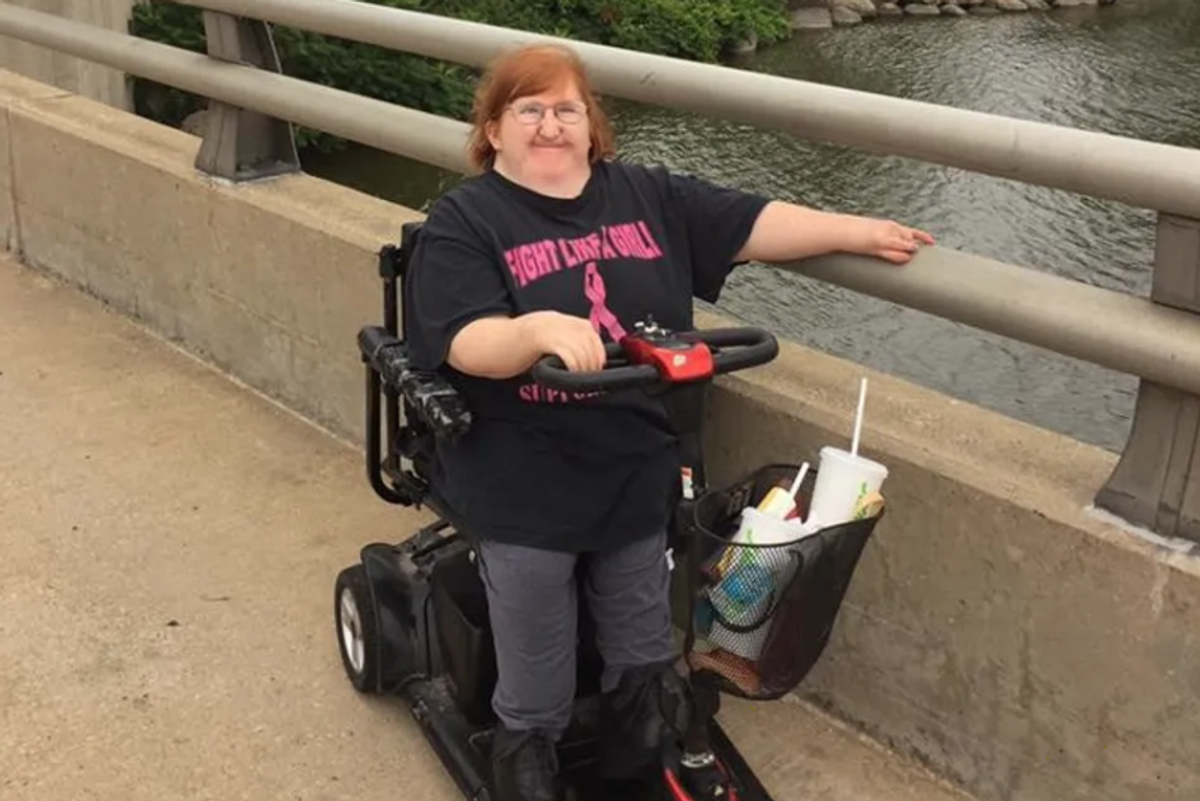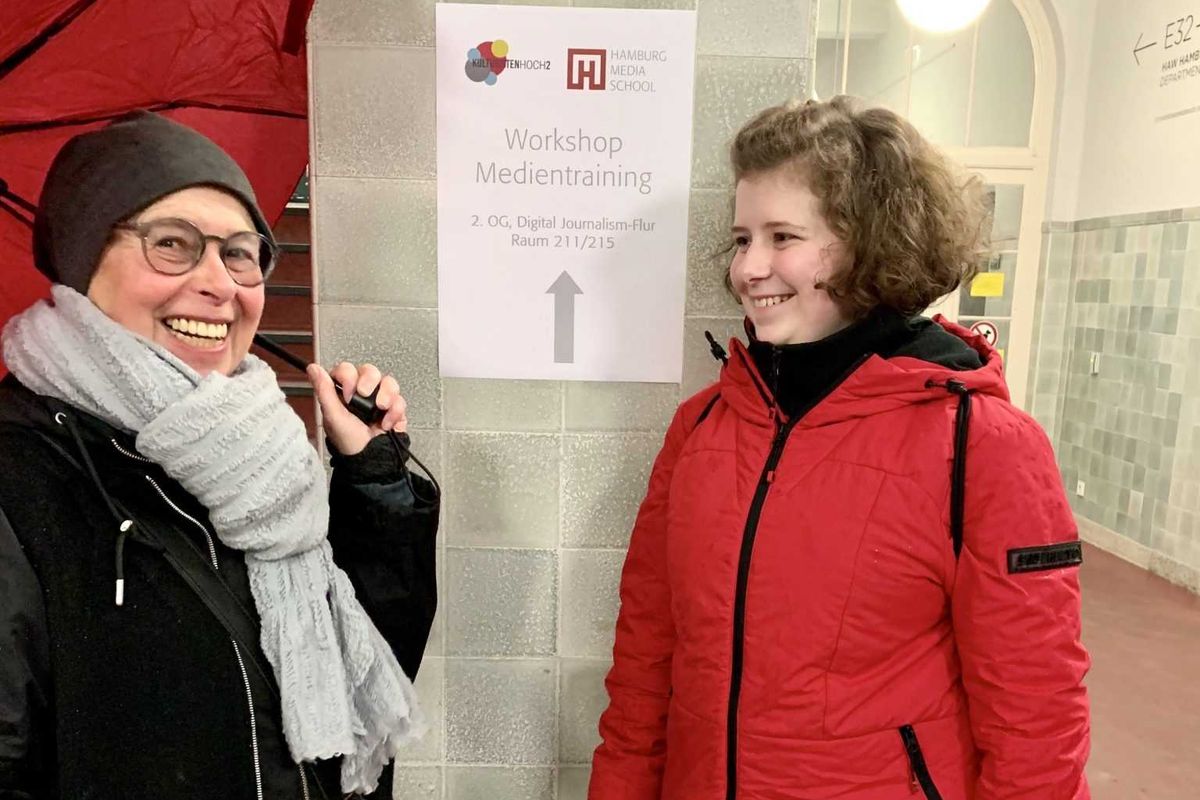
Here's something you should know about me: I'm proud to be disabled.
I can picture some of you looking very perplexed right now. Admitting this fact about myself is something I may have said in a hushed tone just a few years ago. Why? By all accounts, I'm not supposed to be "proud" of my disability. Not according to society, at least. But then again, I've never given much thought to societal conventions. Thankfully, I'm not alone.
July is Disability Pride Month, which is sparking so many much-needed conversations about living with a disability and what it means to celebrate that. People with disabilities make up the largest minority group in the United States, with 61 million adults living with a disability, according to the CDC—that's one and four people.
Disability Pride Month is a time to celebrate people with disabilities. It's also a time to call for changes toward a more inclusive, accessible world. The first Disability Pride Day was held in 1990, coincidentally, the same year as the passage of the Americans With Disabilities Act (ADA); the pivotal legislation was the biggest disability rights win of our generation and it "prohibits discrimination and guarantees that people with disabilities have the same opportunities as everyone else to participate in the mainstream of American life—to enjoy employment opportunities, to purchase goods and services and to participate in State and local government programs and services."
Maybe that's why this year, as we celebrate the 30th anniversary of the ADA, this idea of disability pride feels all the more poignant and important. While I may have reached a place of pride now, I didn't always feel this way.
I was born with Freeman-Sheldon syndrome, a genetic bone and muscular disorder that primarily affects the face, hands and feet. I've had around 25 surgeries to straighten my legs, as well as correcting my scoliosis. I spent the majority of my formative years in and out of the hospital. At times, what was harder than all those surgeries was feeling so different from everyone else. I grew up never seeing anyone that looked like me— not on TV, not in movies, not in books or even magazines. At a time when all I wanted to do was fit in, it was hard to stand out so much.
People are shocked when I say I'm proud to be disabled because we still live in a society where pride and disability don't belong in the same sentence. Disabilities are seen as shameful. They are looked at as something bad. People should feel sorry for us. Who would want to be disabled? That's a question I've heard far too often from too many people. I've had individuals tell me that a disability and wheelchair is nothing to be proud of, it's nothing to celebrate and that it's something I should be ashamed of.
Of course, people's cruel words are only parroting the messages society sends about disabilities. We live in a culture that treats disability as something bad or negative. From a young age, disabled people are taught to be ashamed of something that's a huge part of their identity. I felt ashamed of my disabled body for many years; I wasn't comfortable in my own skin and, interestingly, becoming a writer that helped me change my perspective. The more I wrote about disabilities and about my life, the more I felt a cleansing of sorts. It was as if the act of writing was literally rewriting the voice in my head that had played on a loop for so long. The voice that told me I was ugly. The voice that told me I was unworthy and unlovable. The voice that told me my disability was shameful. It was as if I was shedding my old skin, making way for self-love and self-acceptance after too many years of shame and hatred.
I can't help but feel like 2020 is a reckoning of sorts when it comes to disabilities—a moving of the needle toward inclusion, accessibility, opportunity and acceptance. Those are the things disability activists have been fighting for years to achieve. Because where the ADA is about literal access, Disability Pride Month is all about visibility and representation. It's about inclusion. It's about opportunity. It's about celebration. It's about having a seat at society's table.
I'm forever proud to claim my seat, to unapologetically take up space and to be included. Finally, we're seeing this trend of disabled people reclaiming what it means to have a disability. We don't typically see the words pride and disability together, but for disabled people like me, the two words go hand in hand. "Disability pride" is a declaration as much as it is a celebration, where the disability community is shouting, "Yes, disabled people want to be seen and heard. And guess what? We're not going anywhere!"
My disability pride has taught me to be more vocal. To speak up. And, yes, to show my face, especially through countless selfies on social media. Disabled people are here and we're proud. While Disability Pride Month may be about the disability community, it's also important to have support from able-bodied people.
A huge part of disability pride centers around identity. I know things like "I don't see your disability or wheelchair" are meant as compliments, but those words are actually quite hurtful. It's dismissive of my lived experience as a woman with a disability. It's like saying my disability doesn't exist. Since my disability is a part of my identity, it's like saying I don't exist. It's, again, viewing disability through the ableist lens of disability is bad and able-bodied is good. It's assuming that I want to be seen as "normal." But guess what? Spoiler alert...I am disabled. And it's not a bad word.
My hope is that one day, we won't need any entire month to remind people that it's okay to celebrate disabilities and that society will celebrate us because they see our inherent worth and dignity just like we do. Until that day, though, here's a reminder one more time: Please, see my wheelchair. See my disability. See all of me.
- A few common phrases found in job descriptions may sometimes be ... ›
- If Trump reverses this one law, disabled Americans will lose their ... ›
- The side to the Whole Foods peeled oranges conversation you didn ... ›
- Little girl in a wheelchair gets her very own matching Elf on the Shelf, created by mom ›
- Tig Notaro comes out to her sons - Upworthy ›
- People reveal the dark thoughts they won't say out loud - Upworthy ›
- One dad's wholesome game at Pride events has turned him into a living legend - Upworthy ›





 A UPS truck with package deliveries.Image via Wikipedia
A UPS truck with package deliveries.Image via Wikipedia
 Cher was the biggest phenomenon on the planet for the better part of the '70s and '80s.Casblanca Records/
Cher was the biggest phenomenon on the planet for the better part of the '70s and '80s.Casblanca Records/

 A high school volunteer with her senior "tandem."
A high school volunteer with her senior "tandem."  KH2 makes leaving the house more accessible to senior citizens.
KH2 makes leaving the house more accessible to senior citizens.  Many "culture buddies" stay in contact after the program ends.
Many "culture buddies" stay in contact after the program ends.  KH2 provides students with excellent life skills and lasting connections.
KH2 provides students with excellent life skills and lasting connections. 
 Parents posing with their young kids on a basketball court. via
Parents posing with their young kids on a basketball court. via